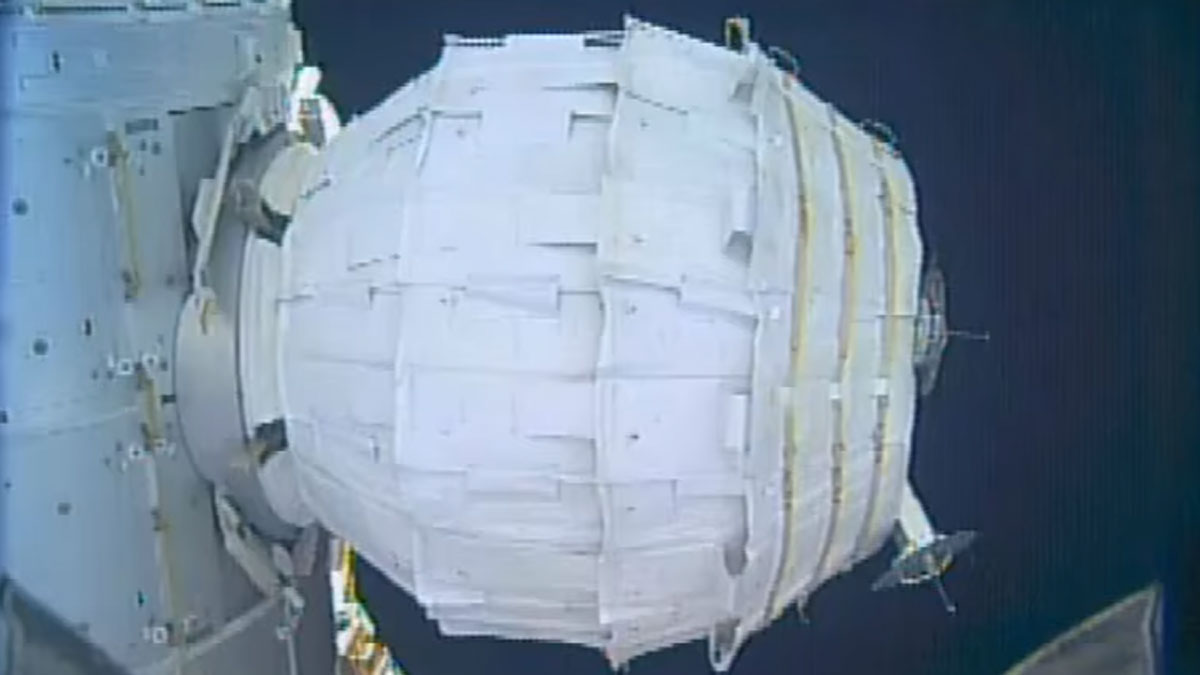Inflatable space hotel could be open for guests in ten years
Expandable room successfully added to the International Space Station ahead of two-year testing period

A free daily email with the biggest news stories of the day – and the best features from TheWeek.com
You are now subscribed
Your newsletter sign-up was successful
Adventurous travellers could soon be bedding down in an inflatable room in space.
Over the weekend, astronauts on the International Space Station (ISS) successfully deployed an extendable add-on housing area that could one day revolutionise life in space, says Quartz.
However, the "space hotel" might need to adopt a catchier name to entice tourists – it is currently known as the Bigelow Expandable Activity Module (Beam).
The Week
Escape your echo chamber. Get the facts behind the news, plus analysis from multiple perspectives.

Sign up for The Week's Free Newsletters
From our morning news briefing to a weekly Good News Newsletter, get the best of The Week delivered directly to your inbox.
From our morning news briefing to a weekly Good News Newsletter, get the best of The Week delivered directly to your inbox.
The Beam prototype, which arrived at the ISS on a cargo spacecraft in April, was gradually pumped full of air over three days. This was the second attempt to inflate the module, after the first try last week ended in failure due to technical problems.
[[{"type":"media","view_mode":"content_original","fid":"95565","attributes":{"class":"media-image"}}]]
The extendable room is the work of Bigelow Aerospace in Nevada, whose founder, Robert Bigelow, already owns a chain of hotels on Earth.
It uses a secret material which is easily folded for transportation and able to inflate in space, but still being tough enough to endure life in orbit.
A free daily email with the biggest news stories of the day – and the best features from TheWeek.com
The Beam will remain at the station for a two-year testing period to confirm it can withstand radiation and collisions with space debris, such as the mini-meteorite that chipped a viewing window on the ISS in 2012.
"Most of the time the module will be closed, but the crew will go in a handful of times to collect data and take a look," Joel Montalbano, the deputy ISS manager at Nasa, told New Scientist in April. Although the prototype has no windows, Montalbano says the 13ft long and 10ft 6in wide module will "feel roomy".
If testing is successful, scientists believe a much larger "space hotel" could be ready to receive visitors within a decade.
-
 How the FCC’s ‘equal time’ rule works
How the FCC’s ‘equal time’ rule worksIn the Spotlight The law is at the heart of the Colbert-CBS conflict
-
 What is the endgame in the DHS shutdown?
What is the endgame in the DHS shutdown?Today’s Big Question Democrats want to rein in ICE’s immigration crackdown
-
 ‘Poor time management isn’t just an inconvenience’
‘Poor time management isn’t just an inconvenience’Instant Opinion Opinion, comment and editorials of the day
-
 Nasa’s new dark matter map
Nasa’s new dark matter mapUnder the Radar High-resolution images may help scientists understand the ‘gravitational scaffolding into which everything else falls and is built into galaxies’
-
 Moon dust has earthly elements thanks to a magnetic bridge
Moon dust has earthly elements thanks to a magnetic bridgeUnder the radar The substances could help supply a lunar base
-
 How Mars influences Earth’s climate
How Mars influences Earth’s climateThe explainer A pull in the right direction
-
 The ‘eclipse of the century’ is coming in 2027
The ‘eclipse of the century’ is coming in 2027Under the radar It will last for over 6 minutes
-
 NASA discovered ‘resilient’ microbes in its cleanrooms
NASA discovered ‘resilient’ microbes in its cleanroomsUnder the radar The bacteria could contaminate space
-
 Artemis II: back to the Moon
Artemis II: back to the MoonThe Explainer Four astronauts will soon be blasting off into deep space – the first to do so in half a century
-
 The mysterious origin of a lemon-shaped exoplanet
The mysterious origin of a lemon-shaped exoplanetUnder the radar It may be made from a former star
-
 The 5 biggest astronomy stories of 2025
The 5 biggest astronomy stories of 2025In the spotlight From moons, to comets, to pop stars in orbit